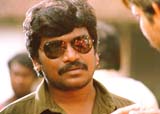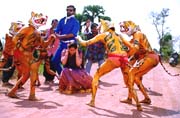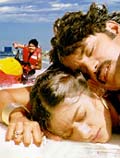'I want to be a free bird'
Sunil Kumar

|
|
Krishna Vamsi
|
He may look like unemployed youth, but appearances... you know what they are. That's the deceptive appearance of Krishna Vamsi, the young director of Ninnepelliadtha, the runaway hit in Telugu, that starred Nagarjuna and Tabu.
Vamsi began with a bang, his first directorial venture Gulabi was an ABCL production. It came after he had spent 10 years in the shadow of ace director Ramgopal Varma.
If both Gulabi and Ninnepelliadtha earned him accolades, Vamsi's next venture, Sindhuram, flubbed at the box office. The director, nevertheless, is unperturbed. That, according to him, was the best of his three films.
"The cardinal rule a film-maker should keep in mind is not to make the audience think while watching a film. The audience should only experience emotions. The moment they try to question or reason out the happenings on the screen, they will not receive the film well," Vamsi says.
Knowing the rule, he decided to break it. "I also have a commitment to society. That is why I wanted to make the audience think with the film. If the film did not do that well at the box-office it was not unexpected." According to him, he could make movies on serious subjects "only if I give commercially hits and entertainers like Ninnepelliadtha." Excerpts from an interview with the director:
Let us begin at the beginning. How did you enter films?
I have enjoyed films since my childhood in Tadepalligudem in West Godavari district. After my intermediate, I wanted to join the film institute in Pune, but my father did not permit me.
He wanted me to complete my graduation before giving serious thought to my proposal. Actually, he did not want me to have anything to do with the film industry. I agreed and went on to do my post-graduation in Agra, but returned home, only to run away to Madras to somehow gain entry into the industry.
You did not inform your parents where you were...
Not for a year. There were other reasons too. After my return from Agra, my friends and I began indulging in the film business. We hired theatres and distributed Khadi starring Chiranjeevi.
This brought us rich returns. However, that did not happen with other films we distributed. All of us lost at least Rs 100,000 each.
There was no way I could get my parents's encouragement to continue to be part of the film industry, so I ran away to Madras in 1986. Only after a year, I went back to them, stayed for a month, and came to Hyderabad.
What did you do in the film industry?

|
Nagarjuna and Tabu in Ninnepelliadtha. Click for bigger pic!
|
Not as an actor, since I lack the looks. I was fascinated by the camera and wanted to work behind it. I managed to get a break, carrying camera equipment in a film unit.
From being a spot boy to becoming a celebrity director, how has the transition been?
My fascination for work has brought me where I am. Though my job was only to carry the camera around initially, I used to observe the cameraman. Nobody teaches anyone in this industry. I learnt as much as I could through observation. The noted director, K S Prakash Rao, used to say, "Our guru is the screen" and, finally, it was the screen which taught me everything.
You were assistant director to Ram Gopal Varma for nearly 10 years. How did your association with him begin?
In 1987, I joined Tripuraneni Varasprasad as assistant director. He was doing a film with Rajendra Prasad and Smitha. The film was produced by Smitha. This film was, however, not completed.
By then I was begging people for a job. Goutam Raju, the film's editor, too was recommending me to everyone.
At this time I was introduced to Nageshwar Rao, the co-director of Shiva, who, in turn, introduced me to Ram Gopal Varma, the film's director. Ramu was directing his first film and I was quite fascinated by the way he worked.
That was also your first brush with Nagarjuna whom you later gave a new image as Greek Veerudu in Ninnepelliadtha. What were your impressions when you first met him?
Both Ramu and Nagarjuna made a lasting impact on me. Though Ramu had not directed any film before, Nagarjuna trusted him to do a good job. Nagarjuna is a down-to-earth person, a hard worker, knowledgeable and lacking in airs. More importantly, he is a person who takes risks. That is evident in his giving a film to a new director like Ram Gopal Varma.
How did Varma make an impact on you?
I started evolving as a director only under Ramu. As a youngster when I watched films I always had many questions. I used to wonder why some scenes had to be shown the way they were shown. I had plenty of questions, but got answers only while working with Ramu. He was a director who dared to throw convention to the winds. He knew how exactly to translate his ideas to images on the screen.
Varma, some say, is more of a technician than a director.
What does that mean? Whoever said that was speaking with half-knowledge. I am not saying that Ramu is the best director around. He has a particular style which critics may not appreciate. For instance, while making Shiva, Ramu asked me how I thought the film would fare. I said it was an average film.

|
J B Chakravarthy and Maheshwari in Krishna Vamsi's Gulabi. Click for bigger pic!
|
He replied it would create a sensation and asked me to wait and see. The film was a roaring success and I was shocked. I learnt various things while assisting him in making Kshana Kshanam, Raat, Drohi Antham, Gaayam and Anaganaga Oka Roju.
Though you praise Varma now, didn't you part ways with him because of differences?
That's true. Our differences were on the approach to Anaganaga Oka Roju. The idea of the film was Ramu's and he asked me to direct it. After two schedules of the shooting of the film, he decided to direct the film himself. I obliged and continued to assist him till the film was complete.
How did Gulabi, your first directorial venture, come your way?
It was again Ramu who offered me the job. This time he said he would not interfere with the way I went about my job. It was completely my own effort.
Did you did think you evolved as a director with Gulabi?
I still do not think I have evolved completely. I learn every day. The experience of directing a film on my own was exhilarating. Of course, there was a lot of tension and pressures. I wanted to prove that I could deliver goods as the experience of my aborted first directorial venture, Anaganaga Oka Roju, haunted me.
What criteria did you adopt to select stars forGulabi? Did your mentor have any say in the selection of the stars?
This was my film and I was responsible for whatever I did. I selected J D Chakravarthy as the hero since we had worked together with Ramu for some years. He fitted the bill perfectly for the role. As for the female lead, I wanted to cast Tabu. When I explained the role to her, she cried.
But since Tabu wanted three or four more months before she gave dates, I had to select another heroine. I picked Maheshwari since she had the sophistication needed for the role. More than that, it was her expressive eyes that finally made me cast her.

|
Nagarjuna and Tabu in Ninnepelliadtha.
|
Why did Nagarjuna want you to direct Ninnepelliadtha?
Nagarjuna saw a couple of songs picturised for Gulabi and said he had instantly decided that I should direct his next film. He called me and informed me about the decision. I was shocked. I told him he had too much confidence in me. I asked him how he could me trust with such a big project.
"I know your capacity. Shut your mouth and start work on the project," he told me. The rest is history.
Nagarjuna is an established star. Was it easy directing him? Or did he interfere with your work?
Nagarjuna is too much of a gentleman to interfere. Of course, we used to have discussions and he used to air his opinions, but he never interfered. With blind belief he entrusted me with the heavy responsibility of directing his film. I had the liberty to shape the film the way I wanted to and in this I had the co-operation of Nagarjuna, Tabu and the entire unit.
What made you select Tabu as the leading lady?
I wanted a girl both with both native looks and a modern image. I screen-tested nearly 60 new girls for the role and suddenly realised that Tabu could best essay the role. I hurriedly narrated the script to her while she was waiting to catch a flight at Bombay airport. Later we discussed the role at length in Madras. And she was keen to do it.
The Hindi version has not done well. Why?
Nagarjuna told me it has done average business. There are many reasons for that. A dubbed film may not have the same impact as the original. Moreover, it probably required different treatment, taking many other things into consideration.
Did you have problems with the censors for your films?
I did. To give an example, they wanted me to delete a shot of Nagarjuna and Tabu rolling on the ground. They took objection to other scenes as well. In my opinion, there should be no censorship at all.
But then who will keep a check on film-makers who want to make a fast buck showing nudity and vulgarity?
What is wrong in it? The general argument given is can a film-maker watch such films with his family? Are people not watching such things in their homes with their families? Like Star Movies and other programmes. The satellite channels show it all. Why then should film-makers be restricted?
If people do not want to watch such things in theatres, they will not go. Why should the censors place restrictions on our creativity and prevent us from showing reality?
Think of the repercussions if there was no censorship in films.

|
Maheshwari in Gulabi. Click for bigger pic!
|
You are probably right, to an extent. If we think we still need censorship, then 50 per cent of the censor board should be from the film industry. But I am not convinced that we should have censorship. Tell me which Indian film has shown intercourse? We know where to draw the line.
If what we show is not acceptable to audiences, they will not come to watch the film. If nudity sells, Ramu's Daud should have fared well, but it didn't. Of course, I have not seen the film.
Varma had problems with the censors for Govinda Govinda andDaud...
All film-makers have problems with the censors. The censors should not prevent us from showing reality. They sometimes object to showing the navel of a woman when, in other films, it is allowed. We cannot even question them. The censors should give us general rules in writing as to what is allowed and what is not, instead of taking decisions according to their whims and fancies.
Despite whatever cuts were suggested by the censors, Ninepelladutha was a big hit. Did you expect it to fare so well?
I was tense, particularly after it was completed. When we saw the film, Nagarjuna walked up to me, hugged me and said I had done a fantastic job. He also said I should not believe anyone who may have a different opinion. The best compliment I received was when he brought his ailing mother from hospital and showed her the film.
What is your next film about?
It is going to be a remake of a Malayalam film, Chandralekha. Nagarjuna will play the lead. We begin shooting in January. I am also planning a film with Nagarjuna and Manisha Koirala.
Of the heroines, whom do you consider most beautiful?
All heroines are beautiful. Otherwise, they would not have become heroines. If I have to give a subjective opinion, Manisha Koirala, Aishwarya Rai and Dimple Kapadia are the most beautiful of the lot in India.
Who are the heroes you admire?
Nana Patekar, Sanjeev Kumar and Dilip Kumar for their talent. I think, among the directors, Vidhu Vinod Chopra and Subhash Ghai are okay, but I like J P Dutta's films best.
Are you satisfied with the quality of the three films you have made?
I can never be fully satisfied with my work. In retrospect, I think I should have made some changes. I make it a point to watch my films in the theatres to gauge audience reactions though I do not take their comments seriously.
How do you react when recognised in the theatres?

|
A still from Ninepelladutha.
|
Actually, not many recognise me. Since I am not seen on screen, the audiences do not even know how I look.
Do you nurture a desire to act?
I have no such inclination. I am content with my work behind the camera.
What do you do in your spare time?
I am always thinking of films.
If it is not films?
I think of sex.
And in whose company are you in when free?
Women. I like them. They are beautiful creatures.
What are your plans for marriage?
The idea has never struck me. In fact, I do not like the idea of marriage.
Why?
I do not want to be bound to a particular woman. I want to be a free man.
|